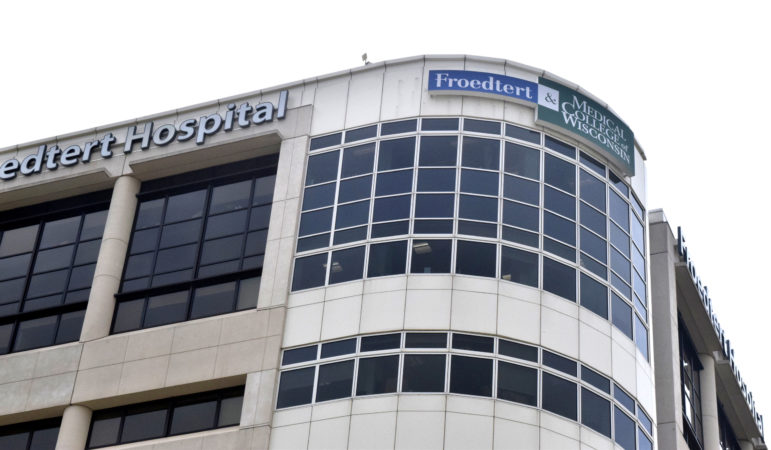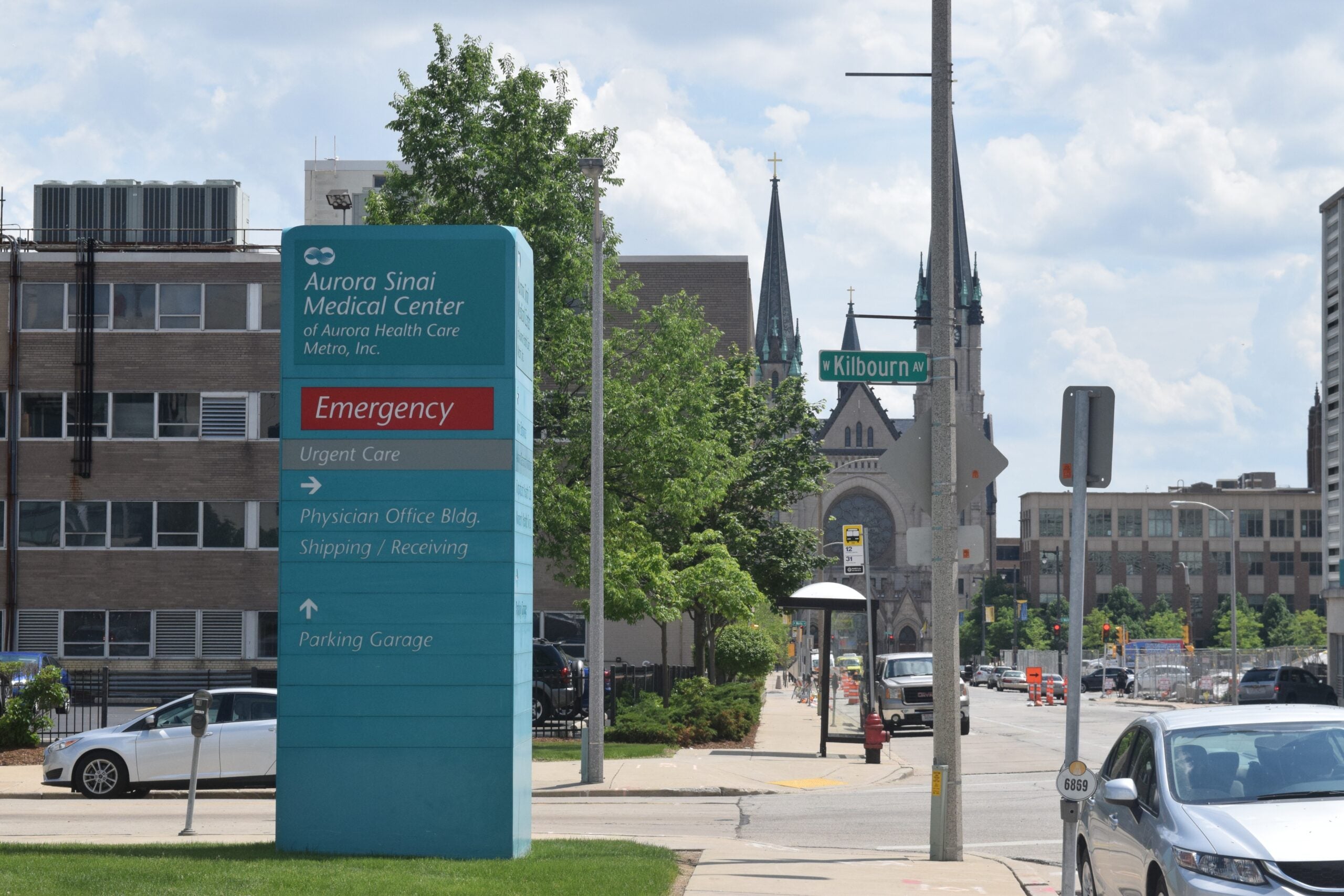Blanche Jordan was surprised on March 29 when a process server appeared at her door in the middle of a pandemic to serve her with a $7,150 medical debt lawsuit. The breast cancer survivor and assisted living facility caregiver was equally surprised on April 15 to learn the suit was dismissed.
“Shut the front door!” Jordan told a reporter who relayed news by phone that Milwaukee’s Froedtert Memorial Lutheran Hospital dropped its lawsuit against her. The bills were from a hysterectomy related to her cancer treatment. The suit was officially dismissed on April 13, court records show.
A Wisconsin Watch/WPR analysis published April 1 found that Wisconsin hospitals sued at least 104 patients over medical debt in small claims court since March 12, when Gov. Tony Evers declared a public health emergency to fight coronavirus. Froedtert Hospital filed 46 of those suits, including 18 cases filed after March 18 when a Froedtert spokesman said the hospital had suspended filing small claims suits during the pandemic.
News with a little more humanity
WPR’s “Wisconsin Today” newsletter keeps you connected to the state you love without feeling overwhelmed. No paywall. No agenda. No corporate filter.
Froedtert dismissed all 18 of those cases shortly after Wisconsin Watch and WPR published their analysis, but the hospital had initially left open 26 other cases — including Jordan’s March 17 suit. Now court records indicate Froedtert has dismissed all of the medical debt suits filed during the public health emergency.
“I don’t even know how to feel right now,” Jordan said. “My heart is racing. I’m shaking right now, because these doctors bills have literally taken over my whole life.”

Jordan said last week she had not received any mail or phone calls regarding the lawsuit or about the $7,150 she allegedly owed Froedtert. The status of that debt remains unclear.
A Froedtert spokesman would not say whether the hospital was also dismissing Jordan’s debt or the debts owed by other patients. Nor would he say whether the hospital could or would refile the debt suits.
“As stated previously, in response to the COVID-19 situation and in the best interest of our patients and our community, Froedtert Health suspended filing small claims suits effective March 18 prior to Governor Evers March 24 ‘Safer At Home’ declaration,” Steve Schooff, the spokesman, wrote in an email Friday. “There has been no change to this policy to date and this policy will remain intact moving forward.”
Schooff added that a “miscommunication” resulted in the lawsuits filed after March 18.
“We immediately rectified this miscommunication and dismissed these small claims cases that were filed after March 18,” he wrote. “No new decisions have been made about active small claims filings. None of these small claims filings were connected to COVID-19 services.”
Financial Assistance For Patients
Schooff also pointed to a page on Froedtert’s website outlining financial assistance available to patients. According to a summary, patients with household income of 250 percent of the Federal Poverty Level or less may be eligible for a full discharge of their debt.
Jordan — a 39-year-old essential worker at an assisted living facility outside of Milwaukee — received a hysterectomy while unaware that Froedtert fell outside of her insurance network. It is unclear whether Jordan’s household income, insurance status and the procedure would have qualified her for the full discount.
Bobby Peterson, executive director of ABC for Health, a nonprofit public-interest law firm in Madison, said hospitals should do more to help patients navigate their payment options.
“Hospitals are supposed to go through their financial assistance procedures to make sure someone might qualify based upon their income and the current situation,” he said. “We find that very few providers go through with that kind of detail.”

Wisconsin hospitals provided $1.2 billion dollars in “uncompensated care” during the 2018 fiscal year, according to a Wisconsin Hospital Association report. Charity care accounted for $590.2 million of that sum, while bad debt — like what Jordan allegedly owed — made up the rest. Charity care on average accounted for about 1 percent of a Wisconsin hospital’s costs.
Tax filings from fiscal year 2017 show Froedtert provided more than $8 million in “financial assistance at cost” during the 2017 fiscal year, accounting for 0.51 percent of its total expenses. The hospital also reported more than $44 million in bad debt.
Peterson said hospitals can prevent much of the bad debt they accrue by ensuring patients take advantage of charity care programs, special enrollment periods for private insurance, disability benefits and Medicaid. But using those programs, Peterson said, is not easy.
“This process is not well advertised. The patient is poorly informed. And the vast majority of staff at a lot of these facilities are poorly trained to provide the type of creative thinking assistance that someone needs,” Peterson said.
To assist with that process, ABC for Health this month released an online tool called “Fighting Forward: Challenging Medical Debt.” It offers strategies for enrolling in and understanding health insurance plans, qualifying for charity care, managing bad debt and rebuilding credit.
“It’s the tip of the iceberg,” Peterson said of the guide. “There’s a lot of options out there.”
‘Wait Until I Call My Mom’
Jordan said Froedtert’s lawsuit dismissal came at the perfect time. She has worked with a group to shore up her credit, aiming to buy a house — a goal she wants “so bad.”
“I don’t even have words for you right now,” Jordan said about the dismissal. “I talk about this all the time. I’ve cried about it. I’ve prayed about it. I’ve screamed. I’ve shouted. Everything.”
Medical debts from Jordan’s breast cancer treatment pushed her into bankruptcy in 2016 and briefly left her homeless following an eviction.
In 2019, the Milwaukee County Small Claims Commissioner Court awarded Froedtert a judgment against Jordan for about $5,300, including court fees, which the hospital claimed by garnishment of her wages. She finished paying that debt during the first week of March — just before Froedtert filed the now-dismissed $7,500 lawsuit.
“Wait until I call my mom. She’s heard me cry when I get paid and they take almost $600 at a time (in garnishments),” Jordan said about the lawsuit’s dismissal, adding that the news left her smiling from “ear to ear.”
This story comes from a partnership of Wisconsin Watch and Wisconsin Public Radio. Bram Sable-Smith is WPR’s Mike Simonson Memorial Investigative Fellow embedded in the newsroom of Wisconsin Watch (wisconsinwatch.org), which collaborates with WPR, PBS Wisconsin, other news media and the University of Wisconsin-Madison School of Journalism and Mass Communication. All works created, published, posted or disseminated by Wisconsin Watch do not necessarily reflect the views or opinions of UW-Madison or any of its affiliates.







